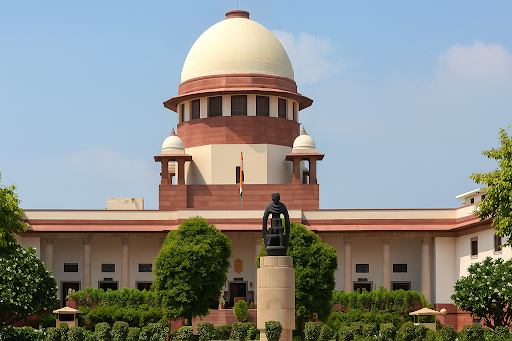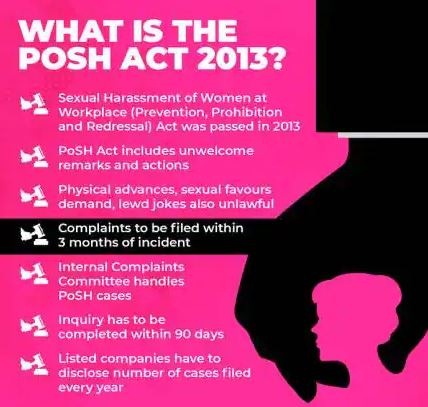



The Supreme Court’s refusal to extend the POSH Act to women political workers exposes a protection gap leaving them vulnerable, undermining gender equality, participation; addressing it requires legislative amendments, Election Commission mandates and party reforms to ensure safe, political spaces.

Copyright infringement not intended
Picture Courtesy: THEHINDU
The Supreme Court dismissed a petition seeking to include women political workers under the Sexual Harassment of Women at Workplace (Prevention, Prohibition and Redressal) Act, 2013 (POSH Act).
About: The POSH Act, enacted in 2013, aims to prevent, prohibit, and redress sexual harassment of women at workplaces, ensuring a safe and respectful environment.
Background: Originated from the 1997 Supreme Court ruling in Vishakha vs State of Rajasthan, which laid down guidelines based on Article 15 (non-discrimination) and United Nations' Convention on the Elimination of All Forms of Discrimination against Women (CEDAW) (ratified by India in 1993). These guidelines formed the basis for the Act.
Definition of Sexual Harassment: Includes unwelcome physical, verbal, or non-verbal conduct of a sexual nature, such as advances, requests for favors, sexually colored remarks, or showing pornography.
Workplace Definition: Broadly covers public and private sector organizations and locations visited during employment.

Key Provisions
Employers must establish an Internal Complaints Committee (ICC) for workplaces with 10+ employees. ICCs have civil court powers for evidence collection.
Local Committees (LCs) handle complaints in smaller organizations or where ICCs are absent.
Employers must conduct awareness programs, display POSH policies, and treat harassment as misconduct.
Penalties for non-compliance include fines up to ₹50,000 and license cancellation.
Harassment of Women in Politics: A 2016 Inter-Parliamentary Union (IPU) survey revealed 82% of women parliamentarians globally face psychological violence, including sexist remarks and threats.
Low Representation: Women hold only 13.6% of Lok Sabha seats. Out of the total 8,360 candidates, who stood in the 2024 Lok Sabha elections, just around 10% were women, reflecting systemic barriers. Safe political spaces could boost participation.
Constitutional Mandate: Articles 14 (equality) and 15 (non-discrimination) support extending POSH protections to party workers, volunteers, and field operatives.
Lack of Grievance Mechanisms: Political parties often lack impartial, external-member-led complaint systems, leading to underreporting of harassment cases.
Electoral Reforms: Aligns with the Election Commission’s push for transparency and accountability in party operations, promoting gender justice.
Global Best Practices: Sweden and Norway have gender-sensitive political frameworks; the UK’s Independent Complaints and Grievance Policy addresses harassment in Parliament.
Petition: Argued that political parties should be considered “employers” under the POSH Act, and the definitions of “workplace” and “employee” should include political contexts.
Court’s Rationale: The Bench, led by CJI B.R. Gavai, dismissed the plea, citing:
Implications: Women political workers, especially at grassroots levels, remain unprotected by formal grievance mechanisms, exacerbating vulnerabilities during campaigns and party activities.
Non-Traditional Structure: Political parties employ temporary workers, volunteers, and field operatives without formal contracts or fixed workplaces, complicating ICC establishment.
Absence of Guidelines: No explicit provisions in the POSH Act address political entities, and parties depend on internal, often biased, disciplinary committees.
Limited ECI Role: The Election Commission’s mandate under Article 324 focuses on elections but lacks clarity on enforcing workplace safety laws like POSH.
Legal Precedents: The Supreme Court’s ruling clarified that political parties are not employers under POSH, setting a precedent for exclusion.
Cultural and Structural Barriers: Patriarchal party structures and lack of transparency (e.g., resistance to RTI Act) hinder accountability and gender justice.
Legislative Amendments: Amend the POSH Act to explicitly include political parties, clarifying “workplace” and “employer” definitions to cover volunteers and field operatives.
Mandatory ICCs: Require political parties to establish ICCs with external members to ensure impartiality and compliance with POSH standards.
ECI Oversight: Empower the Election Commission to mandate ICC formation as a condition of party registration, integrating workplace safety into electoral reforms.
Dedicated Tribunal: Implement the Justice Verma Committee’s recommendation for an Employment Tribunal to handle harassment complaints.
Capacity Building: Conduct mandatory sensitization programs within parties to educate members on sexual harassment and POSH compliance.
Voluntary Adoption: Encourage parties to voluntarily adopt POSH-compliant mechanisms, drawing from global models like the UK.
Public Awareness: Launch campaigns to highlight the need for safe political spaces, stimulating public demand for gender justice in politics.
The Supreme Court’s refusal to extend the POSH Act to women political workers exposes a protection gap that must be filled through legislative clarity, Election Commission oversight, and party-led reforms to secure safe, inclusive political spaces.
Source: THEHINDU
|
PRACTICE QUESTION Q. Critically analyze the challenges in extending the POSH Act, 2013, to political parties. 150 words |
The POSH Act was enacted to protect women from sexual harassment at their workplace. It provides a legal framework for the prevention, prohibition, and redressal of complaints related to sexual harassment.
An ICC is a mandatory committee that must be constituted by every employer with 10 or more employees. Its purpose is to inquire into complaints of sexual harassment.
An employer is a person responsible for the management, supervision, and control of the workplace.







© 2026 iasgyan. All right reserved